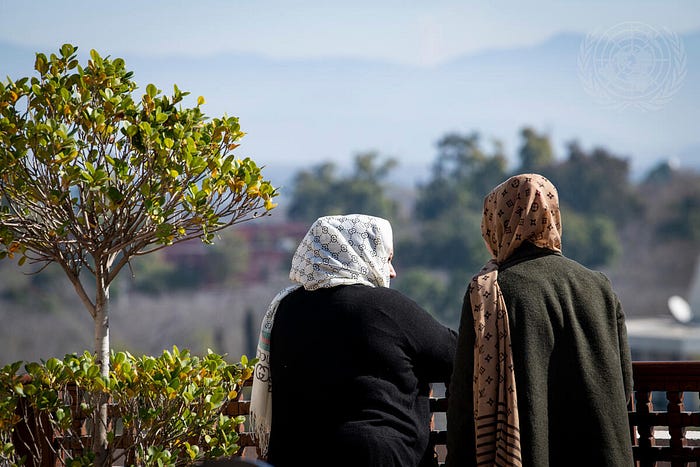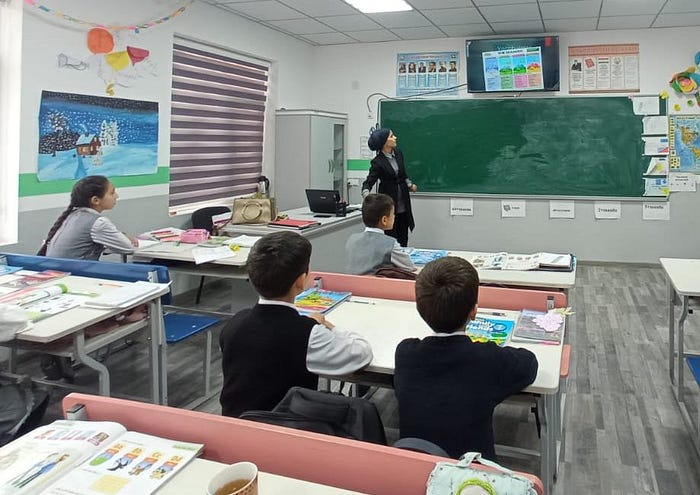What works and what doesn’t: Behavioural change to prevent violent extremism
By Rita Angelini and Isabella Caravaggio

When Shamshad Akhtar was appointed as a gender desk officer in her hometown of Multan, Pakistan, she didn’t expect to face the challenges she did.
The gender desk was established to address gender-based grievances by connecting women to specialized social services. Women were sometimes reluctant to seek help due to a lack of awareness of how to report grievances, and fear of social stigma. As a result of her work, Ms Akhtar faced distrust from the community.
“Men were very suspicious; they did not understand the reason of my presence in their neighbourhood. Some of them even took their mothers and sisters out of the first information sessions,” she said.
Unaddressed grievances are often at the root of violent extremism. To overcome this issue, UNDP designed an experiment to see how these barriers could be addressed through interventions that would “nudge” behaviour to increase the use of the gender desks. Ms. Akhtar gained the trust of the local community and was able to make a meaningful contribution to the stabilization efforts in Pakistan’s Punjab province.


Preventing violent extremism requires addressing the root causes. There are many different assumptions on what these root causes are, and how we can shift behaviour away from extremism and towards more positive pathways. Behavioural insights experimentation brings us closer to understanding what works and to strengthening our responses.
Combining elements of psychology, cognitive science, and social science to discover how humans make choices, behavioural insights have been applied to development practice at an accelerating pace in recent years.
In 2020 and 2021, UNDP in partnership with Nudge Lebanon and B4 Development, carried out three different behaviourial experiments in Pakistan, Uzbekistan, and Tajikistan. They focused on different aspects of strengthening the inclusivity and effectiveness of programmes aimed at preventing violent extremism.
In Pakistan, an intervention was designed to enhance the ability of women in remote areas to access the services of the gender desk, established by UNDP as a key mechanism for addressing gender-related issues, functioning as a referral centre and submitting grievance cases to specialized local organizations for further processing. The intervention aimed to tackle the lack of awareness about the desk and its offers, the fear of social stigma and shame around reporting, low literacy rates amongst the women they were trying to reach, and the mistrust in government services.


Most women in Multan do not own a cell phone nor do they have the internet. UNDP utilized face-to-face interactions to distribute information and increase awareness about the gender desk. This included handing out factsheets which could be understood by the illiterate and those who did not speak Urdu. Through this change, the team noticed a sharp increase in the total number of complaints documented by the desk.
“Thanks to the behavioral intervention, our gender desk officer was able to build trust with women from marginalized communities that are difficult to access. Putting them in touch with services providers, helped repair and strengthen the state-society link which, left unaddressed, leads to the accumulation of grievances. And these grievances lead to conflict — they are also known drivers of violent extremism,” said Dr Simbal Khan, project coordinator.
This model is now being taken to set up gender desks in other areas of Pakistan.
In Uzbekistan, UNDP, UNODC, and UNESCO in partnership with the Youth Union of Uzbekistan implemented the “Youth for Social Harmony in the Fergana Valley” project, funded by the United Nations Peacebuilding Fund. The project aimed to support community resilience and sustain peace by empowering young people to become agents of positive change, training them in management, innovation, business and budget planning, and sustainable investments to help them launch local, viable commercial start-ups.
At the end of the project, 10 active and energetic participants with outstanding project proposals were awarded grants to promote their innovative ideas focused on women, youth and social entrepreneurship. Some participants had been repatriated to Uzbekistan, among the many young people who are repatriated every year to Central Asian countries from conflict areas, including Syria and Iraq. These people often face marginalization and stigmatization. Many of them feel that they do not possess the skills to reintegrate into society, become entrepreneurs, and start their own businesses. Consequently, they often lack the confidence, self-esteem, and determination required to enrol in professional training programmes.


To overcome this, UNDP designed a behavioural experiment for increasing course participation by influencing the youth’s behaviour positively. UNDP produced short inspirational videos recorded by role models and designated ten youth ambassadors to encourage participation and engagement in the training sessions. A total of 263 participants enrolled in the experiment, including 70 young people either repatriated or released from prison. However, only 142 of them participated in the second intervention and the results suggest that the use of youth ambassadors did not improve the low attendance rates. This is mostly due to the relatively short intervention period, the online mode of communication, and a lack of motivation.
UNDP will continue to adapt its approach to ensure similar initiatives achieve greater success in the future, by putting greater care into recruiting, training, and supporting youth ambassadors in their role, standardizing their engagement with participants, considering behavioural barriers such as the length of the programme, and addressing structural issues such as poor internet connectivity.
Still, thanks to UNDP’s intervention, successful participants now have the chance to become role models for many repatriated young women and men to change their lives.
In Tajikistan, UNDP’s work focused on increasing young women and girl’s participation in employability workshops by encouraging them to apply via targeted SMS and phone calls and arranging pre-workshop registration sessions involving the heads of the households. In addition to fostering economic empowerment, these workshops aim to contribute to reducing the gender gap in employment, which can serve as a push factor for radicalization and violent extremism among young women.
The messaging outlined the benefits of attending the workshops for both household decision makers, conventionally men, and young women and girls who were eligible to apply. This was critical to overcoming some of the cultural barriers that can prevent women and girls from engaging in activities outside of the domestic sphere.


Anora Boymurodova is a young teacher from the Chuyanchi village of Shaartuz district. She taught at the village school after the experiment, expressed her interest in participating in the start-up training. As part of the training, participants were encouraged to pitch their ideas, and Anora presented her business plan for creating extra English classes — emphasizing the importance of new teaching methodologies and approaches when teaching English to the rural children in her village.
“For a long time, I had a plan to enhance my teaching capacity by applying new methods and techniques to educate more rural children in my community. After a while, when it became possible to participate in the entrepreneurial training — where my ideas could be supported — I realized that I would soon reach my goal,” she said.
Anora began teaching with her new methods by showing various documentaries and dialogues to the children and interactive games in English. People learned about her unique and comprehensive approaches and expressed interest in their children joining her classes. Attendance in Anora’s classes almost doubled after she participated in the project due to the effectiveness of her courses and her professional growth.

In May 2021 Anora moved to another district where she continues teaching.
“Now, I have two groups of additional English language education for children under the age of 15. Thanks to the experiment, I was able to participate in the training, successfully develop my business plan, find a well-paid job in a private school, and provide free English classes for the most vulnerable families in my community.”
Stories like the those of Shamshad and Anora demonstrate how behavioural insights are a key tool to strengthen the inclusion and empowerment of women and youth in the prevention of violent extremism. At UNDP, we are trying to solve difficult challenges that involve layers of behavioural and cultural norms. Through these experiments, we are reminded that behavioural insights are an important a tool to cut through the noise and to directly test what works and just as importantly, what doesn’t. The experiments demonstrated that they can solve overlapping and complementary problems, such as improving social services to women which contributed to improved access to justice, health, psychosocial support, while simultaneously increasing their resilience against violent extremist recruitment.
Rita Angelini is a consultant in knowledge management and prevention of violent extremism, and Isabella Caravaggio is a programme analyst for prevention of violent extremism.
______
Read UNDP’s new research that shares the results of three behavioural experiments carried out in partnership with Nudge Lebanon and B4Development in Pakistan, Uzbekistan, and Tajikistan, demonstrating how behavourial insights can be a useful tool in strengthening inclusion and participation in efforts to prevent violent extremism. This publication was produced with the financial support of the European Union.
